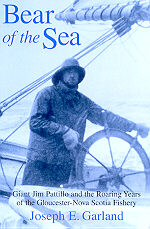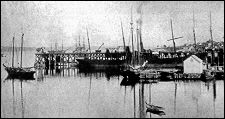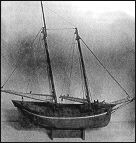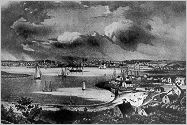February 2002
BOOK REVIEW
- by Carol Standish
 The subject of this rip-roaring biography, Bear of the Sea (Commonwealth Editions, 348pp, $14.95), is James William Pattillo, born in 1806 in Chester, Nova Scotia, the son of a Scottish emigre. (Pattillo evolved from Pattillock.) At 19, he was 6 feet tall and weighed in at 230 pounds. With only seven weeks of schooling under his ample belt, he was barely literate but he was strong as an ox and smart as a whip. �He could do anything he had to do, and he did it. Stonemason, carpenter, woodsman, limeburner, boatbuilder, merchant, mariner, farmer, trader, distiller, lover, and hunter�a great braw laddie�
The subject of this rip-roaring biography, Bear of the Sea (Commonwealth Editions, 348pp, $14.95), is James William Pattillo, born in 1806 in Chester, Nova Scotia, the son of a Scottish emigre. (Pattillo evolved from Pattillock.) At 19, he was 6 feet tall and weighed in at 230 pounds. With only seven weeks of schooling under his ample belt, he was barely literate but he was strong as an ox and smart as a whip. �He could do anything he had to do, and he did it. Stonemason, carpenter, woodsman, limeburner, boatbuilder, merchant, mariner, farmer, trader, distiller, lover, and hunter�a great braw laddie�
At age 11 (about the same age he started drinking), Patillo  began his career at sea, plying the coasting trade with his successful older brother, Tom. He was never long on land again. When Jim was 14, Tom lent him 80 pounds to buy his own boat, a modest little coaster with a big name, Lily of the Valley and Bear of the Sea in which the young Patillo as owner and captain, hauled freight from port to port around the Maritimes until he was 18. He sold the boat back to his brother to take a job as captain of a fishing schooner. began his career at sea, plying the coasting trade with his successful older brother, Tom. He was never long on land again. When Jim was 14, Tom lent him 80 pounds to buy his own boat, a modest little coaster with a big name, Lily of the Valley and Bear of the Sea in which the young Patillo as owner and captain, hauled freight from port to port around the Maritimes until he was 18. He sold the boat back to his brother to take a job as captain of a fishing schooner.
Patillo became as legendary a fisherman as he did a drinker. An accumulation of waterfront incidents and accompanying complaints from more  pacific citizens forced him to make himself scarce, eventually, very scarce. He sailed his own schooner, Eleanor, to Cape Ann where he became an enthusiastically loyal and eventually sober citizen of Gloucester, Massachusetts. During the Civil War he sailed under a letter of the marque but most of the time he was a highliner in the halibut, mackerel, herring and cod fisheries. pacific citizens forced him to make himself scarce, eventually, very scarce. He sailed his own schooner, Eleanor, to Cape Ann where he became an enthusiastically loyal and eventually sober citizen of Gloucester, Massachusetts. During the Civil War he sailed under a letter of the marque but most of the time he was a highliner in the halibut, mackerel, herring and cod fisheries.
Patillo took many liberties at sea, including smuggling. When Canada and the United States signed a fishing rights treaty that did not favor him, he coined the phrase, �we follow the fish, not the treaty.� In fact he held a strong personal mistrust bordering on disregard for misplaced (or misinformed) authority - no doubt rooted in his youthful skirmishes. But he was always highly respected among his peers for his honesty, common sense and sea smarts.
After a devastating fire in the the town, blamed on drunkenness, the Gloucester town fathers appointed Patillo special constable consigned to closing rum shops and enforcing the new temperence law. He had long since quit himself but after a run at the problem, he resigned the constabulary �informing the town�that it couldn�t be done and all they wanted was the money from the fines, anyhow.� a devastating fire in the the town, blamed on drunkenness, the Gloucester town fathers appointed Patillo special constable consigned to closing rum shops and enforcing the new temperence law. He had long since quit himself but after a run at the problem, he resigned the constabulary �informing the town�that it couldn�t be done and all they wanted was the money from the fines, anyhow.�
Fellow Gloucesterman, author Joe Garland, came by Patillo�s story in the Cape Ann Historical Society. A certain W. J. Rakey, an evangelist preacher, wrote down Captain Patillo�s life story as the 80+ year old fisherman recalled it in his retirement. As a prodigious drinker who had long sworn off �ardent spirits� the preacher intended the memoir to be an inspirational temperance tract. in the Cape Ann Historical Society. A certain W. J. Rakey, an evangelist preacher, wrote down Captain Patillo�s life story as the 80+ year old fisherman recalled it in his retirement. As a prodigious drinker who had long sworn off �ardent spirits� the preacher intended the memoir to be an inspirational temperance tract.
Patillo apparently had close to total recall. As Garland cross-referenced the doings and the dates of the Rakey manuscript, (typed by a Patillo  relative from the original hand-written purple pencil document) he was as amazed by its accuracy as he was by the exploits and achievements of the good Captain. In fleshing out the dictated memories, Garland made energetic use of local newspapers in both Nova Scotia and Gloucester, interviews with Patillo relatives, and his own extensive reading in both local history and the history of the fisheries of the North Atlantic, creating a rich background for a big character. relative from the original hand-written purple pencil document) he was as amazed by its accuracy as he was by the exploits and achievements of the good Captain. In fleshing out the dictated memories, Garland made energetic use of local newspapers in both Nova Scotia and Gloucester, interviews with Patillo relatives, and his own extensive reading in both local history and the history of the fisheries of the North Atlantic, creating a rich background for a big character.
This is history with never a dull moment, but the story is not the only reason Bear of the Sea is a rollicking good read. The New York Times observed when the book was first published in 1966 (under a different title), �The beauty of this book lies in Mr. Garland�s complete union with his subject. For one not born and brought up on the New England shore, it is hard to appreciate the intimate feeling for the living past in this seaward-looking region. We have never come across anyone in its literature who has this feeling more strongly than Mr. Garland.�
|
 The subject of this rip-roaring biography, Bear of the Sea (Commonwealth Editions, 348pp, $14.95), is James William Pattillo, born in 1806 in Chester, Nova Scotia, the son of a Scottish emigre. (Pattillo evolved from Pattillock.) At 19, he was 6 feet tall and weighed in at 230 pounds. With only seven weeks of schooling under his ample belt, he was barely literate but he was strong as an ox and smart as a whip. �He could do anything he had to do, and he did it. Stonemason, carpenter, woodsman, limeburner, boatbuilder, merchant, mariner, farmer, trader, distiller, lover, and hunter�a great braw laddie�
The subject of this rip-roaring biography, Bear of the Sea (Commonwealth Editions, 348pp, $14.95), is James William Pattillo, born in 1806 in Chester, Nova Scotia, the son of a Scottish emigre. (Pattillo evolved from Pattillock.) At 19, he was 6 feet tall and weighed in at 230 pounds. With only seven weeks of schooling under his ample belt, he was barely literate but he was strong as an ox and smart as a whip. �He could do anything he had to do, and he did it. Stonemason, carpenter, woodsman, limeburner, boatbuilder, merchant, mariner, farmer, trader, distiller, lover, and hunter�a great braw laddie�
 began his career at sea, plying the coasting trade with his successful older brother, Tom. He was never long on land again. When Jim was 14, Tom lent him 80 pounds to buy his own boat, a modest little coaster with a big name, Lily of the Valley and Bear of the Sea in which the young Patillo as owner and captain, hauled freight from port to port around the Maritimes until he was 18. He sold the boat back to his brother to take a job as captain of a fishing schooner.
began his career at sea, plying the coasting trade with his successful older brother, Tom. He was never long on land again. When Jim was 14, Tom lent him 80 pounds to buy his own boat, a modest little coaster with a big name, Lily of the Valley and Bear of the Sea in which the young Patillo as owner and captain, hauled freight from port to port around the Maritimes until he was 18. He sold the boat back to his brother to take a job as captain of a fishing schooner.
 pacific citizens forced him to make himself scarce, eventually, very scarce. He sailed his own schooner, Eleanor, to Cape Ann where he became an enthusiastically loyal and eventually sober citizen of Gloucester, Massachusetts. During the Civil War he sailed under a letter of the marque but most of the time he was a highliner in the halibut, mackerel, herring and cod fisheries.
pacific citizens forced him to make himself scarce, eventually, very scarce. He sailed his own schooner, Eleanor, to Cape Ann where he became an enthusiastically loyal and eventually sober citizen of Gloucester, Massachusetts. During the Civil War he sailed under a letter of the marque but most of the time he was a highliner in the halibut, mackerel, herring and cod fisheries.
 a devastating fire in the the town, blamed on drunkenness, the Gloucester town fathers appointed Patillo special constable consigned to closing rum shops and enforcing the new temperence law. He had long since quit himself but after a run at the problem, he resigned the constabulary �informing the town�that it couldn�t be done and all they wanted was the money from the fines, anyhow.�
a devastating fire in the the town, blamed on drunkenness, the Gloucester town fathers appointed Patillo special constable consigned to closing rum shops and enforcing the new temperence law. He had long since quit himself but after a run at the problem, he resigned the constabulary �informing the town�that it couldn�t be done and all they wanted was the money from the fines, anyhow.�
 in the Cape Ann Historical Society. A certain W. J. Rakey, an evangelist preacher, wrote down Captain Patillo�s life story as the 80+ year old fisherman recalled it in his retirement. As a prodigious drinker who had long sworn off �ardent spirits� the preacher intended the memoir to be an inspirational temperance tract.
in the Cape Ann Historical Society. A certain W. J. Rakey, an evangelist preacher, wrote down Captain Patillo�s life story as the 80+ year old fisherman recalled it in his retirement. As a prodigious drinker who had long sworn off �ardent spirits� the preacher intended the memoir to be an inspirational temperance tract.
 relative from the original hand-written purple pencil document) he was as amazed by its accuracy as he was by the exploits and achievements of the good Captain. In fleshing out the dictated memories, Garland made energetic use of local newspapers in both Nova Scotia and Gloucester, interviews with Patillo relatives, and his own extensive reading in both local history and the history of the fisheries of the North Atlantic, creating a rich background for a big character.
relative from the original hand-written purple pencil document) he was as amazed by its accuracy as he was by the exploits and achievements of the good Captain. In fleshing out the dictated memories, Garland made energetic use of local newspapers in both Nova Scotia and Gloucester, interviews with Patillo relatives, and his own extensive reading in both local history and the history of the fisheries of the North Atlantic, creating a rich background for a big character.